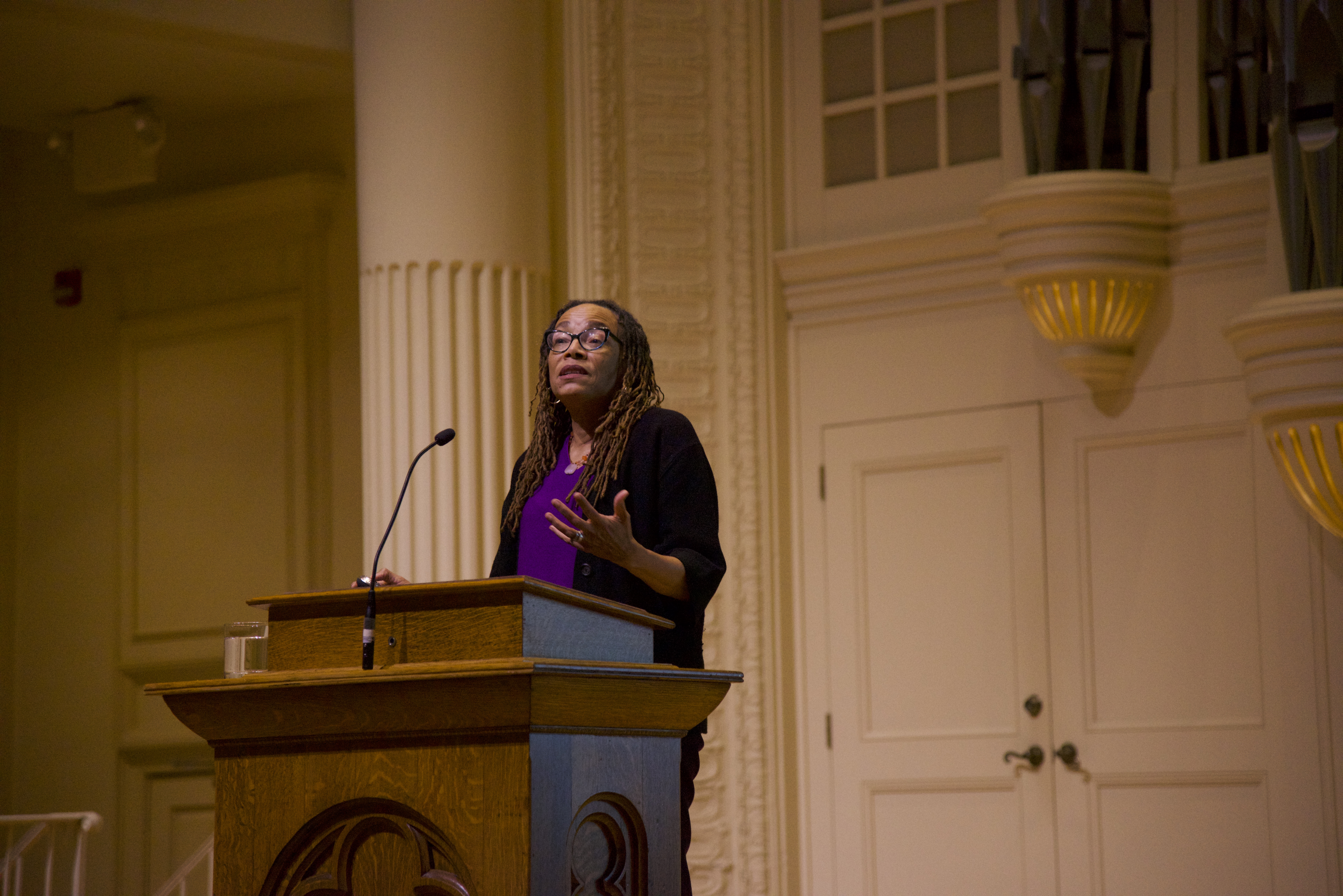Roberts, a professor of law and sociology at the University of Pennsylvania, delivered the Periclean Scholars Guest Lecture on Thursday evening in Whitley Auditorium.
In June, the U.S. Supreme Court made a landmark decision with its Dobbs v. Jackson Women’s Health Organization ruling, overturning reproductive freedom that had been granted with the Roe v. Wade decision in 1973.
Despite how devasting the decision has been for human rights, Dorothy Roberts, Periclean Scholars Guest Lecturer, raises the question: did we have true reproductive freedom in America before the Dobbs decision?
“One way to look at it is thinking about the extent of reproductive freedom that we had at the time Roe was decided and subsequent decisions,” said Roberts, the Penn Integrates Knowledge Professor and George A. Weiss University Professor of Law & Sociology at the University of Pennsylvania, to those gathered in Whitley Auditorium on Oct. 20 for her lecture, “From Reproductive Choice to Reproductive Justice.”
Roberts, the author of “Killing the Black Body” and “Torn Apart: How the Child Welfare System Destroys Black Families and How Abolition Can Build a Safe World,” cited the Harris v. McRae decision, which ruled that states participating in Medicaid aren’t required to fund medically necessary abortions, and the Planned Parenthood v. Casey case, which decided states could deliberately put obstacles in the path of people seeking to terminate a pregnancy as long as it wasn’t an undue burden.
In the immediate aftermath of the latter ruling, states around the country wasted no time putting those barriers in place, blocking people from exercising what should have been a constitutional right. “There were hundreds of laws passed, many of them passed in recent years, that were very restrictive,” Roberts said. “Is it a real freedom if states can pass laws to prevent you deliberately from exercising your right? Usually, we think that if we have a right that means our government representatives shouldn’t be able to keep us from exercising it. But that was different in this type of right.”
More broadly, Roberts spoke on how in all of U.S. history, there has been a lack of true reproductive freedom. From the reproductive servitude of Black women during slavery to the compelled sterilization during the 19th and 20th centuries that still occur today, at no point have all women in America been in complete control of their bodies.

Roberts said there are numerous prejudice policies in the United States based on the idea that Black women’s fertility is a biological threat to their children, communities and the nation. Vile stereotypes and derogatory terms, such as “welfare queen” or “crack babies” – which research have consistently discredited as a mere myth – were pushed by many major press outlets and led to the implementation of many harmful policies, including the prosecution of pregnant Black women who were on drugs and the ending of federal entitlement to welfare.
Referencing editorials from the Philadelphia Inquirer and the Houston Post, Roberts illustrated how many people believed that Black children were going to be biologically disadvantaged by their mothers. “This author [of the Houston Post editorial] isn’t saying that this bio-underclass is caused by structural racism. They’re saying that this bio-underclass of Black children is caused by their mothers,” she said.
“Half of the Black children in America are born into poverty. A shameful figure that the nation should be ashamed of,” she continued. “But instead, they’re asserting, ‘Well, it’s not the fault of inequality in our nation. It’s because their mothers are having too many babies.’”
Roberts argued that to overcome these injustices, we must think about them not only through a humanistic lens but also through an abolitionist lens. Asking ourselves what we need to change and what we need to build is the starting point for having a society where true freedom can be an actuality and not just a theory.
“If we think about how to join movements for social change – the movement for family justice, to abolish prisons, for reproductive justice, economic justice, environmental justice – all of these are essential to building a society where people can truly have autonomy over their bodies,” she said. “Truly thrive in our society without the kinds of policies and images that are devaluing anybody’s ability to have children.”
The Periclean Scholar Guest Lecture was a result of work from the Class of 2024 Periclean Scholars. This cohort of Periclean Scholars has been focused on promoting antiracist initiatives and was interested in bringing Roberts to Elon for her equity work in reproductive justice. To that end, they wrote a Fund for Excellence grant and collected sponsorships, said Vanessa Drew-Branch, faculty mentor for the scholars. “They’re not interested in equity for equity’s sake, they’re trying to change things on campus, in Alamance County and eventually in Morocco, once we start working there.”
Director of Project Pericles Mat Gendle said this cohort of scholars has been actively contacting various groups and organizations to make the event possible to further the mission of Project Pericles.
“The overall mission is to help our students learn how to do ethical, appropriate and impactful community-engaged work with community partners. And I think Dr. Roberts coming to Elon supports the broader mission of the Class of 2024,” Gendle said, “of trying to engender and increase constructive conversation on our campus about what antiracism is.”
The Periclean Scholar Guest Lecture was a part of the Elon University Speaker Series, presented by WUNC North Carolina Public Radio. This year’s speaker series explores the theme of “Living Well in a Changing World.”



